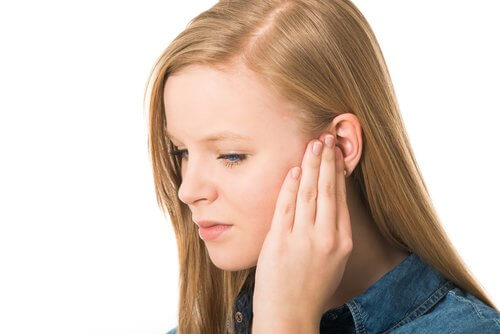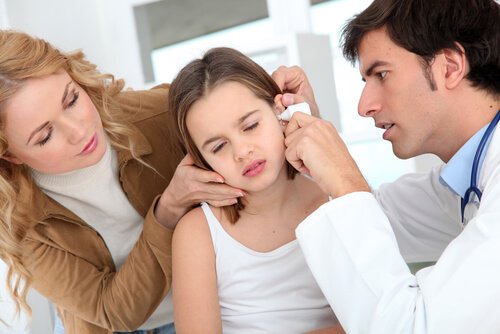Ruptured Eardrums in Children: What You Need to Know

Ear infections are quite common in children. While they usually aren’t serious, they do sometimes produce other issues. Ruptured eardrums are one of these possible problems. Today, we’ll give you all the information you need to know about this condition.
Children’s ears are an especially sensitive area, especially when it comes to infections. It’s very common for issues to arise, since their Eustachian tubes – part of the middle ear – are shorter and straighter than those of adults.
This anatomic detail contributes to the appearance of ear infections. Just the same, infections aren’t the only possible cause of ruptured eardrums. We’ll tell you more below.
Causes of ruptured eardrums in children
There are many issues that can end up causing a tear or a rupture in a child’s eardrum. The most common causes of ruptured eardrums in children are the following:
- Ear infections: Swelling in the ear canals, called otitis, can produce a ruptured eardrum, given the accumulation of infected liquid. This liquid places pressure on the eardrum until it breaks.
- The presence of foreign bodies or trauma: Children often fall into the temptation of inserting foreign objects into their ear canal. If the object reaches the tympanic membrane, it can cause the tissue to rupture.
- Sudden pressure changes in the environment: Explosions, improper scuba diving practices, and the sudden descent of an airplane can all cause the eardrum to tear or even rupture completely.
At the same time, any blow to the ear or accumulation of water inside the ear can lead to a ruptured eardrum.

Symptoms of ruptured eardrums in children
When a ruptured eardrum occurs due to an infection, children will notice a decrease in pain.
This is because, when the eardrum ruptures, the pressure that the infected liquid placed on the membrane reduces. As a result of this occurrence, liquid that contains blood and pus will flow from the ear.
When trauma is to blame, it will cause a sharp pain that may become weaker. Another classic symptom is a constant buzzing in the injured ear.
Dizziness, vertigo and vomiting can also occur as the result of a perforated eardrum. This is no minor detail – it highlights the importance of the ear as the foundation of our sense of balance.
“It’s very common for issues to arise, since their Eustachian tubes – part of the middle ear – are shorter and straighter than those of adults.”
Is preventing ruptured eardrums in children possible?
The fact of the matter is, it’s practically impossible to prevent the rupture itself. However, ruptures are reversible.
Ruptured eardrums almost always heal and usually don’t cause long-term damage. This is true as long as the issue that caused the rupture is eliminated.
The healing process can take from just a few weeks up to several months. Good care and regular visits to the doctor can help make this process shorter.

While there’s no guarantee of total effectiveness, the following tips can help to prevent the causes of rupture:
- See a pediatrician if your child shows even the slightest sign of infection: Ear infections are dangerous if they aren’t treated quickly and adequately.
- Stay alert if you see that your child places an object in his or her ear.
- Take proper precaution when taking your child scuba diving or to places where there will be explosions (like fireworks) or gunshots. Follow your pediatrician’s recommendations about how to prevent ruptures in these situations.
- Use ear protection. It’s always good to be extra careful when your children will be going under water, because of the possible accumulation of liquid in their ears.
Remember that children are more prone to infections, but they also have a great capacity to recover. Despite the obvious pain and discomfort that having a ruptured eardrum implies, it usually don’t cause permanent damage.
Ear infections are quite common in children. While they usually aren’t serious, they do sometimes produce other issues. Ruptured eardrums are one of these possible problems. Today, we’ll give you all the information you need to know about this condition.
Children’s ears are an especially sensitive area, especially when it comes to infections. It’s very common for issues to arise, since their Eustachian tubes – part of the middle ear – are shorter and straighter than those of adults.
This anatomic detail contributes to the appearance of ear infections. Just the same, infections aren’t the only possible cause of ruptured eardrums. We’ll tell you more below.
Causes of ruptured eardrums in children
There are many issues that can end up causing a tear or a rupture in a child’s eardrum. The most common causes of ruptured eardrums in children are the following:
- Ear infections: Swelling in the ear canals, called otitis, can produce a ruptured eardrum, given the accumulation of infected liquid. This liquid places pressure on the eardrum until it breaks.
- The presence of foreign bodies or trauma: Children often fall into the temptation of inserting foreign objects into their ear canal. If the object reaches the tympanic membrane, it can cause the tissue to rupture.
- Sudden pressure changes in the environment: Explosions, improper scuba diving practices, and the sudden descent of an airplane can all cause the eardrum to tear or even rupture completely.
At the same time, any blow to the ear or accumulation of water inside the ear can lead to a ruptured eardrum.

Symptoms of ruptured eardrums in children
When a ruptured eardrum occurs due to an infection, children will notice a decrease in pain.
This is because, when the eardrum ruptures, the pressure that the infected liquid placed on the membrane reduces. As a result of this occurrence, liquid that contains blood and pus will flow from the ear.
When trauma is to blame, it will cause a sharp pain that may become weaker. Another classic symptom is a constant buzzing in the injured ear.
Dizziness, vertigo and vomiting can also occur as the result of a perforated eardrum. This is no minor detail – it highlights the importance of the ear as the foundation of our sense of balance.
“It’s very common for issues to arise, since their Eustachian tubes – part of the middle ear – are shorter and straighter than those of adults.”
Is preventing ruptured eardrums in children possible?
The fact of the matter is, it’s practically impossible to prevent the rupture itself. However, ruptures are reversible.
Ruptured eardrums almost always heal and usually don’t cause long-term damage. This is true as long as the issue that caused the rupture is eliminated.
The healing process can take from just a few weeks up to several months. Good care and regular visits to the doctor can help make this process shorter.

While there’s no guarantee of total effectiveness, the following tips can help to prevent the causes of rupture:
- See a pediatrician if your child shows even the slightest sign of infection: Ear infections are dangerous if they aren’t treated quickly and adequately.
- Stay alert if you see that your child places an object in his or her ear.
- Take proper precaution when taking your child scuba diving or to places where there will be explosions (like fireworks) or gunshots. Follow your pediatrician’s recommendations about how to prevent ruptures in these situations.
- Use ear protection. It’s always good to be extra careful when your children will be going under water, because of the possible accumulation of liquid in their ears.
Remember that children are more prone to infections, but they also have a great capacity to recover. Despite the obvious pain and discomfort that having a ruptured eardrum implies, it usually don’t cause permanent damage.
This text is provided for informational purposes only and does not replace consultation with a professional. If in doubt, consult your specialist.








